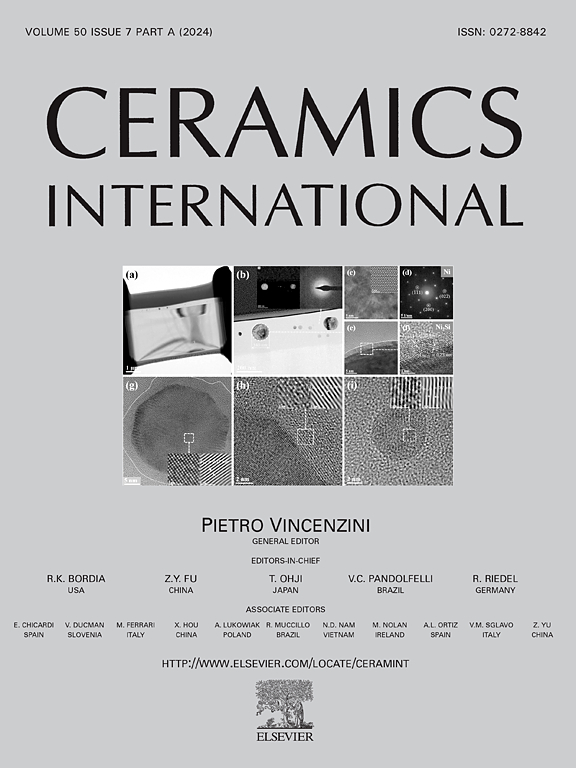Sol-gel derived Bi2NiNb2O9 pyrochlore:合成、表征和介电性能
IF 5.1
2区 材料科学
Q1 MATERIALS SCIENCE, CERAMICS
引用次数: 0
摘要
我们首次采用 Pechini 法合成了相纯的含镍立方热长石 Bi2NiNb2O9(空间群 Fd-3m,a = 10.5371(5) Å),而固相反应法则无法获得无杂质的热长石。在 950°С 的合成温度下,形成了晶界不清晰的低孔隙率陶瓷。元素图谱结果表明,金属原子在样品表面均匀分布。X 射线能量色散分析表明,合成样品的化学成分符合预定的理论成分。热分析研究了 Pechini 法合成样品的煅烧过程,煅烧温度高达 1100°С。通过振动光谱(傅立叶变换红外光谱)分析了合成中间产物的功能成分。在焦绿宝石的傅立叶红外光谱(4000-400 cm-1)中,确定了 829、540、654 和 490 cm-1 处的吸收带。使用阻抗光谱法研究了焦绿宝石的介电性能。烧绿石 Bi2NiNb2O9 的相对介电常数高达 145,介电损耗低至 0.001(24°С,1 MHz),因此有望成为多层陶瓷电容器的介电材料。本文章由计算机程序翻译,如有差异,请以英文原文为准。
Sol–gel derived Bi2NiNb2O9 pyrochlore: Synthesis, characterization and dielectric properties
The Pechini method was used for the first time to synthesize the phase-pure nickel-containing cubic pyrochlore Bi2NiNb2O9 (space group Fd-3m, a = 10.5371(5) Å), while the solid-phase reaction method provided no possibility to obtain impurities-free pyrochlore. At a synthesis temperature of 950°С, low-porosity ceramics with indistinct grain boundaries were formed. The results of elemental mapping indicated a uniform distribution of metal atoms on the surface of the sample. The X-ray energy dispersive analysis showed that the chemical composition of the synthesized sample corresponded to the predetermined theoretical composition. The calcination of the sample synthesized by the Pechini method was studied by the thermal analysis up to 1100°С. The functional composition of intermediate synthesis products was analyzed by vibrational spectroscopy (FTIR). In the FTIR spectrum of pyrochlore (4000–400 cm−1), absorption bands were identified at 829, 540, 654, and 490 cm−1. The dielectric properties of the pyrochlore were studied using an impedance spectroscopy. Pyrochlore Bi2NiNb2O9 has the high relative dielectric permittivity of 145 and low dielectric losses of 0.001 (at 24°С, 1 MHz), which make it a promising for dielectric in multilayer ceramic capacitors.
求助全文
通过发布文献求助,成功后即可免费获取论文全文。
去求助
来源期刊

Ceramics International
工程技术-材料科学:硅酸盐
CiteScore
9.40
自引率
15.40%
发文量
4558
审稿时长
25 days
期刊介绍:
Ceramics International covers the science of advanced ceramic materials. The journal encourages contributions that demonstrate how an understanding of the basic chemical and physical phenomena may direct materials design and stimulate ideas for new or improved processing techniques, in order to obtain materials with desired structural features and properties.
Ceramics International covers oxide and non-oxide ceramics, functional glasses, glass ceramics, amorphous inorganic non-metallic materials (and their combinations with metal and organic materials), in the form of particulates, dense or porous bodies, thin/thick films and laminated, graded and composite structures. Process related topics such as ceramic-ceramic joints or joining ceramics with dissimilar materials, as well as surface finishing and conditioning are also covered. Besides traditional processing techniques, manufacturing routes of interest include innovative procedures benefiting from externally applied stresses, electromagnetic fields and energetic beams, as well as top-down and self-assembly nanotechnology approaches. In addition, the journal welcomes submissions on bio-inspired and bio-enabled materials designs, experimentally validated multi scale modelling and simulation for materials design, and the use of the most advanced chemical and physical characterization techniques of structure, properties and behaviour.
Technologically relevant low-dimensional systems are a particular focus of Ceramics International. These include 0, 1 and 2-D nanomaterials (also covering CNTs, graphene and related materials, and diamond-like carbons), their nanocomposites, as well as nano-hybrids and hierarchical multifunctional nanostructures that might integrate molecular, biological and electronic components.
 求助内容:
求助内容: 应助结果提醒方式:
应助结果提醒方式:


